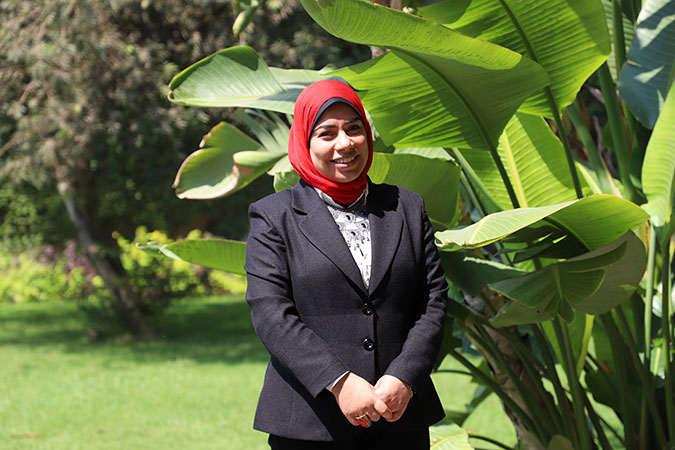Take Five: "In order to end violence against women, we need to work first on changing mindsets"
Date:

Amira Mahmoud is a law school graduate who works as the manager of a women’s shelter in Alexandria, Egypt. Opened in 2010 under the umbrella of the Egyptian Ministry of Social Solidarity, the shelter offers legal aid and psycho-social support and counselling to women survivors of violence in addition to facilitating access to financial assistance and income-generating opportunities. Under the ‘Ending Violence Against Women: Survivor Centered Approach’ programme, implemented in collaboration with the Ministry of Social Solidarity, the National Council for Women, Care International in Egypt and five local NGOs, and with the support and generous contribution of USAID, UN Women Egypt has worked closely with government counterparts to strengthen the capacities of service providers, especially shelter staff, lawyers and prosecutors to ensure that they follow quality standards and protocols. Additionally, capacity development was provided to local NGOs on case management steps to address the immediate needs of women related to incidents of violence.
How does the shelter support survivors of violence?
When the survivor arrives at the shelter, we leave her in peace and quiet for three to four days in her own room and then we start tailoring her rehabilitation plan, focusing on three aspects: mental, social and spiritual wellness. Sometimes, women are referred to us who are totally desperate and despondent; these women require a different plan. First, we encourage them to attend therapy sessions organized here at the center, then we start tailoring a plan that takes into consideration the survivor’s psychological state.
When they are ready for the next step, we offer the women our services and invite them to join in our activities. We have a handicrafts center, a kitchen for the survivors and a day-care center for children. If they want to work outside the shelter, we connect them with businesses through our network. We also encourage them to save the money they gain and open saving accounts as we provide them with necessary resources to cover all their needs. However, we are not a replacement for their own homes.
How do you promote the services of the shelter in the community?
We have several ways to promote our services yet the most successful outreach method to reach our beneficiaries is through field visits and awareness sessions. We have a network of rural women leaders who join convoys in cooperation with the Ministries of Health, Education, and Interior. At the sessions, we talk about the different types of violence against women such as early marriage and female genital mutilation (FGM). We also use social media platforms such as Facebook to promote our training sessions and activities.
What are the main challenges that you face while supporting survivors of violence?
In some governorates of Egypt, we still find harmful traditions such as early marriage. Some parents get their girls married at 13 or 14 years old, which is illegal. Other challenges we face are negative societal perceptions, as in some governorates, mothers are afraid to stop FGM, because they believe that their daughters won’t be able to get married if they have not been subjected to it. Convincing them of the opposite takes a lot of time and effort.
How is UN Women supporting the shelter? And how has this partnership enhanced the work of the shelter?
The most significant benefit that UN Women has offered the shelter is to build the capacity of the staff. We received training on how to deal with the cases of violence from a psychological point of view, and how to understand the survivors’ needs. We had various trainings to help us work with the women, for example on body language and anger management techniques. UN Women also provides us with different trainings to support our work including workplan development, strategic planning and resource mobilization. On top of this, UN Women has also helped us to upgrade the infrastructure and facilities of the shelter.
In your opinion, what is needed to end violence against women in the community?
In order to end violence against women, we need to work first on changing mindsets. We need to engage men and boys to reduce and combat violence against women. A fundamental step in ending violence against women is raising awareness about its dire consequences on women, families and communities as a whole.